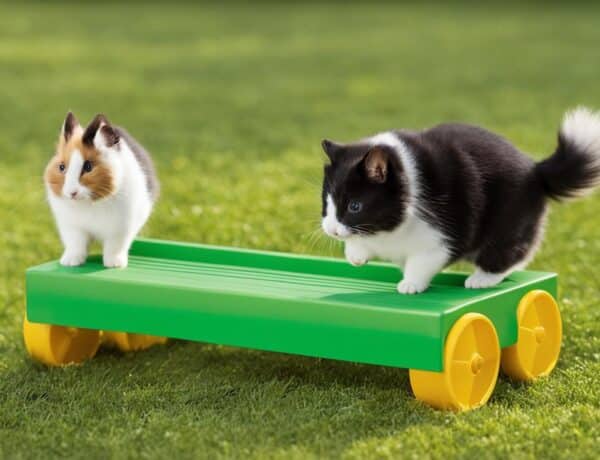Cultivating positive habits for your pet’s health and behavior is crucial for their overall well-being. Whether you have a senior pet or a young one, incorporating healthy habits can have numerous benefits for their physical and mental health. In this article, we will explore 10 healthy habits that you can start implementing today to keep your pet happy and healthy. These habits have been gathered from reputable sources and are endorsed by experts in the field.
Key Takeaways
- Positive habits play a vital role in maintaining your pet’s health and behavior.
- Consult with a veterinarian to ensure you are making informed decisions about your pet’s well-being.
- Replace unhealthy treats with healthier alternatives to prevent weight gain and related health problems.
- Regular exercise and playtime are essential for your pet’s physical and mental well-being.
- Socialization and training help your pet develop positive behaviors and prevent behavioral issues.
Bringing Your Pet in for a Checkup
Before starting any new health journey with your pet, it’s essential to bring them in for a checkup with a qualified veterinarian. This pet checkup is a crucial step in ensuring their overall well-being. By seeking professional advice, you can make informed decisions and establish healthy habits right from the start.
During the checkup, the veterinarian will conduct a thorough examination to assess your pet’s current health status. They will check for any pre-existing health conditions that may impact the changes you plan to make in their diet or lifestyle. This assessment will help you tailor your approach and ensure you consider any specific needs your pet may have.
“Regular check-ups are also recommended to support your pet’s long-term health and prevent potential issues,” says Dr. Lisa Thompson, a renowned veterinarian with over 10 years of experience. “It provides an opportunity to catch any developing problems early on and take preventive measures.”
Regular checkups are not only beneficial for identifying health problems but also for maintaining your pet’s overall well-being. These visits allow the veterinarian to monitor your pet’s health over time and detect any changes that may require attention.
Once you have established a relationship with a trusted veterinarian, it’s recommended to schedule regular checkups based on their guidance. These routine visits will help you stay on top of your pet’s health and address any concerns before they escalate.
Why Is a Checkup Important for Your Pet’s Health?
A checkup with a veterinarian goes beyond a physical examination. It offers a comprehensive assessment of the following:
- Physical health: The veterinarian will examine your pet’s body condition, weight, teeth, ears, and coat. They may also order blood tests, X-rays, or other diagnostic procedures to get a deeper understanding of their health status.
- Behavioral health: Your veterinarian will assess your pet’s behavior and address any concerns you may have regarding their emotional well-being.
- Disease prevention: Regular vaccinations, flea and tick prevention, and deworming treatments are essential to protect your pet from harmful diseases. The veterinarian will ensure your pet is up to date on all necessary preventive care measures.
By prioritizing regular checkups, you are taking proactive steps to ensure your pet’s healthy habits and maintain their optimal health and happiness.
Remember, a qualified veterinarian is your pet’s best ally when it comes to their well-being. Consult with them regularly and follow their recommendations for a long and fulfilling life for your furry friend.
Phasing Out Unhealthy Treats
Many pet owners often find themselves indulging their furry friends with a variety of treats. While this may seem like a loving gesture, it can actually lead to health issues in pets. It’s crucial to recognize the importance of providing your pet with a balanced diet and gradually phasing out unhealthy treats.
As a responsible pet owner, I have realized the significance of making this dietary change for my beloved companion. It’s important to consult with a veterinarian to identify suitable alternatives that will not compromise your pet’s health and happiness. Whether it’s low-calorie treats or substituting with fresh vegetables, they can offer a healthier option without sacrificing the joy of receiving treats.
My veterinarian recommended incorporating a variety of vegetables into my pet’s diet as an alternative to unhealthy treats. Not only are they low in calories, but they also provide essential nutrients to support my pet’s overall well-being.
Consistency is key when making this transition. Initially, your pet may resist the change, but persistence and patience will help them adjust. By gradually introducing healthier treat options and ensuring a consistent supply, your pet will start to appreciate these new treats and their overall health will benefit as a result.
It’s important to remember that this adjustment can have a profound impact on your pet’s long-term health. By avoiding excessive calorie intake from unhealthy treats, you can prevent weight gain and reduce the risk of obesity-related health problems.
| Unhealthy Treats to Phase Out | Healthy Treat Alternatives |
|---|---|
| Processed treats high in sugar and preservatives | Natural treats made from high-quality ingredients |
| Fatty treats that contribute to weight gain | Low-calorie treats or fresh fruits and vegetables |
| Treats with artificial colors and flavors | Homemade treats or treats with natural flavors and colors |
Remember, your pet’s health is in your hands. By replacing unhealthy treats with nourishing alternatives, you are making a positive contribution to their overall well-being.
By adopting this healthy habit of phasing out unhealthy treats, you are taking a proactive approach to ensure a happier, healthier life for your furry friend. Your veterinarian will be your guiding light throughout this journey, providing valuable insights and personalized recommendations tailored to your pet’s specific needs.
Daily Exercise and Playtime
Daily exercise plays a vital role in ensuring the physical and mental well-being of your pet. Regular walks for dogs and engaging playtime sessions for cats are essential for maintaining a healthy weight, improving fitness, and preventing diseases. As a responsible pet owner, it’s crucial to prioritize at least 30 minutes of exercise or playtime each day. Incorporating these activities into your daily routine will help promote positive habits and contribute to your pet’s overall health.
Whether you choose to take your dog for a refreshing walk around the block or engage your cat in interactive play sessions with toys, regular physical activity is essential. Not only does it provide a healthy outlet for their energy, but it also stimulates their minds and helps prevent behavioral issues caused by boredom or excess energy.
Benefits of Pet Exercise:
- Maintains a healthy weight
- Improves cardiovascular health
- Strengthens muscles and bones
- Enhances mental stimulation
- Reduces anxiety and stress
- Promotes socialization and bonding
Remember, every pet is unique, and their exercise needs may vary based on factors such as age, breed, and health condition. Consult with your veterinarian to determine the ideal exercise routine for your furry friend. They can provide personalized recommendations and ensure that your pet’s exercise plan aligns with their specific needs.
By consistently providing daily exercise and playtime for your pet, you are fostering healthy habits that contribute to their overall well-being. So, lace up your shoes, grab the leash, or get your cat’s favorite toy ready – it’s time to embark on an exciting journey of physical activity and play with your beloved pet!
| Benefits of Daily Exercise and Playtime | Activities |
|---|---|
| 1. Maintains a healthy weight |  |
| 2. Improves cardiovascular health | |
| 3. Strengthens muscles and bones | |
| 4. Enhances mental stimulation | |
| 5. Reduces anxiety and stress | |
| 6. Promotes socialization and bonding |
Socialization and Training
Socialization and training are essential for pets to develop positive behaviors. Whether you have a dog or a cat, exposing them to different people, pets, and experiences can help them become well-adjusted and confident. Training your pet to follow basic commands and learn new tricks not only strengthens the bond between you and your furry friend but also provides mental stimulation. It’s crucial to start socialization and training early on to prevent behavioral issues and foster healthy habits.
When it comes to socialization, gradually introduce your pet to various environments, such as parks, busy streets, or other pet-friendly places. This exposure will help them become comfortable and less anxious in different situations. Additionally, encourage interactions with other well-behaved pets and introduce them to a variety of people, including children and strangers.
Training your pet is another key aspect of their development. Start with basic commands like sit, stay, and come. Use positive reinforcement techniques, such as treats and praise, to reward your pet for following commands correctly. Consistency is key to successful training, so set aside regular training sessions and practice the commands in different environments to reinforce their learning.
Not only does training improve your pet’s behavior, but it also provides mental stimulation. Engage your pet with puzzle toys, interactive play, and training sessions to challenge their minds and keep them mentally sharp. This mental stimulation helps prevent boredom and destructive behaviors.
Remember to be patient and consistent throughout the socialization and training process. Every pet learns at their own pace, so it’s important to tailor your approach to their individual needs. If you’re uncertain about how to properly socialize or train your pet, consult a professional trainer or enroll them in obedience classes.
“Training gives us the tools to communicate with our pets and set them up for success. Socialization allows them to adapt to the world around them and be well-rounded companions. Together, they form the foundation for a happy and harmonious relationship.”
Benefits of Socialization and Training:
- Promotes positive behaviors
- Enhances the bond between pet and owner
- Improves confidence and reduces anxiety
- Prevents behavioral issues
- Provides mental stimulation
| Training Tips | Socialization Tips |
|---|---|
| Start with basic commands and gradually progress to more advanced ones | Expose your pet to different environments, people, and animals |
| Use positive reinforcement techniques | Encourage positive interactions and reward good behavior |
| Be patient and consistent | Practice regular socialization exercises |
| Seek professional training help if needed | Gradually increase the level of difficulty during socialization |
Conclusion
Cultivating positive habits for your pet’s health and behavior is a lifelong commitment. By implementing the 10 healthy habits discussed in this article, you can enhance your pet’s life and ensure their overall well-being.
Remember to consult with your veterinarian for personalized advice and guidance. They can provide valuable insights and recommendations tailored to your pet’s specific needs. Veterinarians play a crucial role in promoting pet health and can help you navigate any challenges or concerns you may have.
By prioritizing your pet’s health and incorporating these habits into your routine, you can provide them with a happy and healthy life. Maintaining a balanced diet, regular exercise, socialization, and positive reinforcement training are key components in promoting optimal pet health and fostering positive behaviors.
Take small steps each day to implement these habits and be consistent in your efforts. Your pet will benefit greatly from the love, care, and attention you invest in their well-being. Together, let’s create a healthier future for our furry friends.
FAQ
Why is cultivating positive habits important for my pet’s health and behavior?
Cultivating positive habits for your pet’s health and behavior is crucial for their overall well-being. It can have numerous benefits for their physical and mental health, ensuring they lead a happy and healthy life.
Why is it important to bring my pet in for a checkup?
Bringing your pet in for a checkup with a qualified veterinarian is essential before starting any new health journey. It helps determine if there are pre-existing health conditions to consider when making changes to their diet or lifestyle, ensuring informed decisions and long-term health support.
How can I phase out unhealthy treats for my pet?
To phase out unhealthy treats, consult with your veterinarian to find suitable alternatives, such as low-calorie treats or vegetables. Be consistent in offering these healthier options, and over time, your pet will adjust and enjoy them, preventing weight gain and related health problems.
Why is daily exercise and playtime important for my pet?
Daily exercise and playtime are crucial for your pet’s physical and mental well-being. They help maintain a healthy weight, improve fitness, prevent diseases, and promote positive habits. Aim for at least 30 minutes of exercise or playtime each day.
Why is socialization and training important for my pet?
Socialization and training are essential for pets to develop positive behaviors. They help them become well-adjusted and confident, prevent behavioral issues, and provide mental stimulation. Start socialization and training early on to foster healthy habits and strengthen the bond between you and your pet.
How can I cultivate positive habits for my pet’s health and behavior?
By implementing the 10 healthy habits discussed in this article, you can cultivate positive habits for your pet’s health and behavior. Remember to consult with your veterinarian for personalized advice and guidance to ensure your pet’s well-being.






No Comments